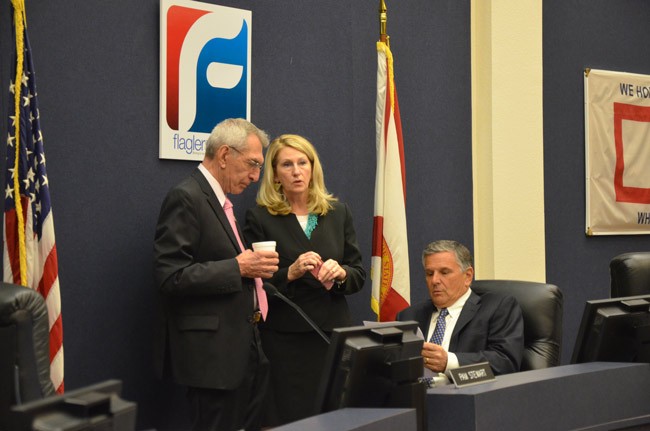
Holding its monthly meeting in Bunnell for the first time in memory, the state Board of Education Wednesday morning unanimously approved a resolution urging the Legislature to make education funding a priority and to preserve a large, planned increase in the state’s education budget as lawmakers convenes in special session June 1 to resolve a budget impasse over health care.
“I imagine that I stand beside my fellow board members in saying that I’d like to urge our legislators during this special session to approve the historic request for the highest-ever per-pupil funding,” board member Rebecca Lipsey of Aventura said. “I think it’s very important for them to join together and stand beside our students and our teachers and do what’s best for our schools and communities and approve that budget that we all put forth for them.”
Gov. Rick Scott warned last week that a planned $261 per student funding increase from the current year was in jeopardy this year, as was a $690 million tax-cut package, if the House and Senate do not work out differences over how to cover health care’s “Low-Income Program” dollars, or LIP, a $2.2 billion program that sends money to health care providers to cover poor people’s bills.
The federal dollars will run out at the end of June absent an agreement between Florida and the federal government on how to cover those costs. The federal government is urging Florida to do so by expanding Medicaid and reduce duplication of services. The Florida Senate agrees, and passed a $2.8 billion plan to use Medicaid expansion dollars for the purpose. Scott, who opposes Medicaid expansion, is refusing the deal. So is the House. That created the impasse that led to the sudden, premature end of the last legislative session, and the need for the June 1 special session.
There is still no deal the various sides have agreed upon, causing educators anxiety about the coming year’s budget. Florida school districts’ budget year begins July 1.
The historic per-pupil funding increase is “extremely important,” Gary Chartrand, serving his last meeting as the state education board’s chairman, said this morning. “And I’d like to remind everyone here and the Legislature that we actually have a surplus this year, and let’s not forget that. I know there’s some issues with the health care, and the Legislature is coming together to work that out. There’s also tax cuts that have been proposed, and I would hope that we fund education first before we move in any other direction. We need to make sure that our students are our priority in the state.”
Board member John Padget framed the matter in terms of economic development. “The most important one for me is to reinforce that our Florida’s economic future depends on today’s education priorities,” Padget, the vice chairman of the board and a Key West resident, said. “Our system needs, our state needs the highest per-pupil funding, and I’d like to make sure we discuss this today and send a clear message, because I’m afraid education might get lost in all the other issues that will be brought up and we cannot afford to let that happen.”
Education Commissioner Pam Stewart, appointed to the post by Scott, navigated a difficult rope, at once praising the governor for bringing the state out of recession and helping to usher in a budget surplus, but also implicitly bucking the governor on his threat to postpone education funding increases. During difficult times, Stewart said, “districts had to learn what they could live without and in that process they have gotten very good at knowing, now that we will have more money, what we will do with that money to best improve student outcomes.” But that money should be appropriated: “The time is the right one,” Stewart said. “Everything is set in place for this legislature to do the right thing by education in the state of Florida and really invest in the economic development of our state through the educational system.”
The board hadn’t planned to vote on the matter. Board member Michael Olenick suggested it does, to send a message to lawmakers and also to draft the voices of the state superintendents’ association, the state school board association and the state’s teachers unions. The rest of the board agreed to do just that, and unanimously approved a resolution to that effect.
Much of the meeting, expected to last through lunch, was devoted to routine matters, but was to include a presentation by Flagler Superintendent Jacob Oliva, speaking on behalf of the Florida Association of District School Superintendents, on initiatives in K-12 education. The local school board took advantage of its state colleagues’ visit to jam the lobby of the Government Services Building with displays showcasing the Flagler district’s own initiatives, particularly its Flagship program, which emphasizes a state board priority: inserting science education throughout the curriculum as a means of closing the “skills gap” that prevails in Florida, between students’ capabilities and the job marketplace’s demands.
Chartrand, the board chairman, said the state is creating about 25,000 jobs a month, but still suffers from that skills gap. But there are 292,000 jobs unfilled in the state, 50,000 of them in computer sciences alone, he said. “We have got to prepare our children for the jobs of the future, and that’s where the jobs are going,” Chartrand said.





























Leave a Reply